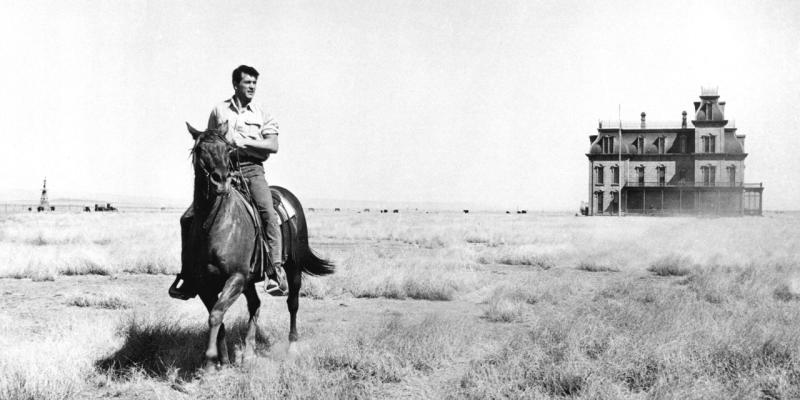'Giant,' a Great American Epic Film
By: Peter Tonguette (WSJ)



In the American popular consciousness, the idea of a work of art that takes measure of our great, flawed, messy nation looms large. Debates have raged over which book is the Great American Novel, and the competition is no less stiff in the realm of cinema.
From D.W. Griffith's Revolutionary War epic "America" (1924) to John Ford's Cavalry trilogy, including "She Wore a Yellow Ribbon" (1949), to Robert Altman's portrait of country-music stars and strivers, "Nashville" (1975), filmmakers have long been tempted by the prospect of telling the American story writ large. Few films have more fully tapped the medium's capacity for capturing the sweep of national history than George Stevens's 1956 classic drama "Giant," which chronicles more than two decades in Texas, beginning in the 1920s, a period of social changes, cultural shifts and the alteration of the land itself. Earlier this summer, Warner Bros. brought out a restored version of the film on 4K UHD Blu-ray.
Based on Edna Ferber’s 1952 novel, “Giant” takes the form of a multigenerational family saga. Jordan “Bick” Benedict Jr. (Rock Hudson) is the head of a cattle-ranching dynasty that owns Reata, a 595,000-acre ranch whose enormousness is emphasized by numerous wide shots that make the family’s otherwise imposing Victorian mansion appear as puny as a dollhouse amid the vast emptiness. Shot in large part on real locations, including Marfa, Texas, the film savors the immensity of the terrain and the loneliness of the civilization erected upon it.
Stevens and screenwriters Fred Guiol and Ivan Moffat tease big and compelling themes from the story’s potentially melodramatic interpersonal dramas, including Bick’s loving but contentious marriage to a headstrong Marylander, Leslie (Elizabeth Taylor); his disappointment that his dreams do not align with those of his son, Jordy (played, as an adult, by Dennis Hopper); and his bafflement over the ascent of ranch hand Jett Rink (James Dean), who, after lucking into a parcel of oil-rich land, reinvents himself as a tycoon. Yet these plot points are vessels for the film’s portrait of a world undergoing transformation: Bick’s gradual acceptance of Leslie’s independent views mirrors broader changes in relations between the sexes, while Bick’s resentment toward Jett anticipates a time when oil began to challenge cattle as the signature export of the Lone Star State.
Most strikingly, Stevens uses the entirety of this film to chart the evolution of Bick’s attitudes about race. Over the course of the three-hour-and-21-minute running time, Bick’s reflexive racism—expressed in his condescension toward, and disinterest in the wretched living conditions of, the Mexican-Americans who work at Reata—comes to fall away; a shorter film would have rendered this reformation less credible. In a climactic scene directed with the graphic simplicity and intensity of an animated cartoon, Bick—having by now become reconciled to Jordy’s marriage to a Mexican-American woman, a union that produces a child—engages in a fistfight with a racist diner proprietor over his offensive treatment of Bick’s multiracial family and his harassment of a Mexican family whom he tries to toss out of his establishment. In an irresistible touch, blows between the men are landed as “The Yellow Rose of Texas” plays on the jukebox—here, Bick’s masculine toughness at last has a noble purpose.
At this point in his career, it’s little wonder that Stevens was attracted to a novel as ambitious as Ferber’s. Although he made his reputation with carefree entertainments on the order of “Swing Time” (1936), “Gunga Din” (1939) and “The More the Merrier” (1943), Stevens’s service in World War II, which included shooting footage of the Dachau concentration camp after its Allied liberation in 1945, resulted in a postwar run of films striking for their seriousness of purpose, including “A Place in the Sun” (1951) and “Shane” (1953). Stevens was awarded his second Best Director Oscar for “Giant.”
Yet the film’s greatness lies as much in its grace notes as in its broad strokes. Unlike more doctrinaire filmmakers of the time, such as Stanley Kramer, Stevens never permits his film’s message to overtake its artistry. Taking full advantage of his film’s length, Stevens savors memorable supporting characters, including Bick’s sour-tempered sister Luz (an agreeably salty Mercedes McCambridge), who is certain of Leslie’s inadequacies at the start of the film—she warns that the Easterner’s blood is too thin for Texas—but who is herself felled when she insists upon riding her sister-in-law’s fearsome horse, War Winds. Stevens incorporates expressive, digressive moments—such as when Leslie and Jett, two outsiders, are seen in parallel as each drifts from a rowdy picnic underneath a scorching sun: she under a spindly tree, he alone in the back of a car, with his hat tossed on his propped-up cowboy boots—and is unafraid of inference: Bick and Leslie’s actual wedding is one of several pivotal events elegantly indicated but never seen.
When we finish watching “Giant,” we feel that we have learned something deep and true not only about Texas but America itself. In Marilyn Ann Moss’s biography “Giant: George Stevens, a Life on Film,” the director is quoted as saying that the film, despite the specificity of its setting, “could be the story of any section of the United States, confronted with parallel problems.” What could be more American than cattle seen against a great horizon, oil gushing forth from the ground or a family contending with progress?





I never knew how to rate this movie.
Is it really Great?
Although I've already watched the movie more than once, I'll have to watch it again taking into consideration the author's analysis before I can answer that question. I confess that I most likely focused more on James Dean, but will try to be a little more universal the next time.
I didn't see it until I was in my 30's and the woman who recommended it thought of it as the best movie she ever saw. As soon as I read that review, I began to wonder.